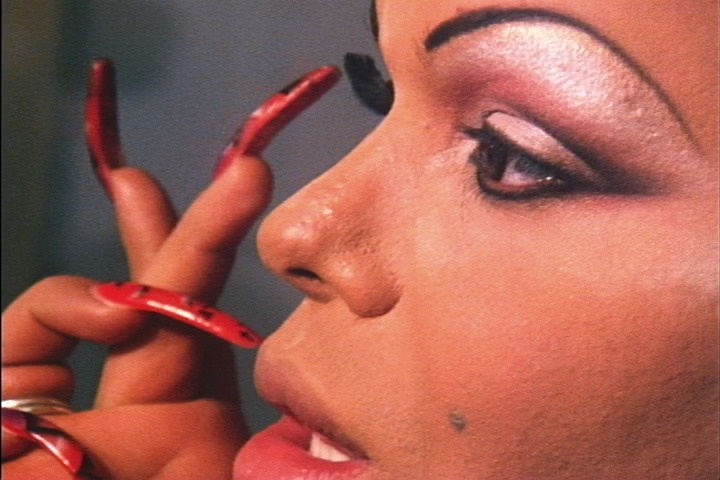
A Day in a Transgender Life
Written by Elizabeth Engel | Posted by: Anonymous
In her films Boquita and Mizery, Carmen Oquendo-Villar documents the day-to-day lives of two different drag queens in Boston, giving the world a better understanding of transgender nightlife performers. Her work has been shown at film festivals, galleries, and museums around the world, and it will be shown in Boston on February 8, 2007 at the Women in Film & Video New England series Chicks Make Flicks. The Chicks Make Flicks events feature the work of local female filmmakers every second Thursday of the month at 7 pm and include a discussion panel after the show.
Carmen Oquendo-Villar always had a passion for films, but for a long time she was more interested in watching them. While living in Boston she got the idea to document Latino transgenders in New York. However, a friend, questioned her as to why she didn’t want to make films where she lived. So, that is how she decided to film the documentaries in Boston.
Before making the documentaries, Oquendo-Villar was working in gender issues for a while but not as an activist. I was “fascinated by the trans community, but I can’t say that I understood it,” says Oquendo-Villar. She said the more involved she became, the better she understood the trans community. She found that if you look at everyday life, there are many things that are common to all of us.
Oquendo-Villar is working on her PhD at Harvard, focusing on media and politics in the literature department. Her film Boquita started off as a project for a basic filmmaking class she was taking at Harvard. Harvard doesn’t have a film program at the graduate level, but she was able to use the Film Studies Center at Harvard to make Boquita. She used a small crew of two people, filming and editing with the help of Richard E. Ruiz.
Boquita is the story of a transgender nightlife performer from the Dominican Republic called Boquita. Boquita, who currently resides in Jamaica Plain, MA, works as an AIDS prevention counselor at the Hispanic Office of Planning and Evaluation (HOPE) in Jamaica Plain during the day and performs at various nightclubs in Massachusetts at night. In the film, we see her at home with her friends, at her day job, and getting ready for a show. She has conversations with other transgenders at her job, talking about relationships and other issues. And at home, she talks on the phone, watches television, puts on makeup, and hangs out with friends. Transgender is a different lifestyle than most people experience, but the film shows Boquita in a way that is humanizing — as she does everyday things.
At the end of the film, Boquita is at home watching television and makes fun of a beauty pageant contestant on the TV, criticizing her style in a comical way. The inclusion of the pageant contestant is ironic because society lauds one type of beauty while it denigrates another. The documentary aims to show a “day in the life” of Boquita in a purely inspirational way. The film is a 10-minute short in Spanish with English subtitles.
While filming the nightclub scenes for Boquita, Oquendo-Villar met Mizery. Oquendo-Villar was shooting on Mizery’s night to perform, and Mizery thought that they should be making a film about her. Mizery is from Panama, but unlike Boquita, most people don’t realize that she is from Latin America because she doesn’t have an accent and she is black. She has been in the United States since she was nine years old, so she is more fluent in English. For this reason, Mizery was shot in English. Oquendo-Villar co-directed Mizery with Joaquin Terrones and Deidra Perley.
At the beginning of Mizery we see Mizery walking into the nightclub, then we see her dancing and performing in full makeup and costume on stage. However, it is the scenes showing the preparation backstage that truly show a glimpse into Mizery’s life and personality. Backstage Mizery puts on her makeup and helps another performer put on her makeup. Performing is Mizery’s career and she does not have a day job. She tells the camera that performing is still fun for her but it is more work than fun. When she gets to work, she hesitates to put on her makeup. “You don’t want to put it on,” she says. Then once she has her makeup laid out at her station she thinks, “OK, let’s get started… and then once you start putting it on it becomes fun.” Mizery paints her face in detailed purples and pinks and sparkled eye shadow in a skilled fashion that shows her as more of an artist than anything else.
During the film Mizery talks about how she fell in love with the nightlife. A friend of hers took her to her fist nightclub, and she loved the music, the dancing, and the people on stage and on boxes. The performers she saw were amazing to her, and she decided that performing in drag is what she wanted to do. Through directing Mizery and Boquita, it “makes me realize that performance is one of the outlets for people who have had very hard lives,” says Carmen Oquendo-Villar.
Life for a transgender person in Boston can be very difficult, according to Oquendo-Villar. “Even though there’s more resources here than other places, it’s not safe,” she says. There is job vulnerability and healthcare is a problem. Performers who do not work regular fulltime jobs have a difficult time getting health insurance. And, there is always the issue of violence resulting from prejudice.
As a result of her world acclaim for her documentaries on transgender, Oquendo-Villar was invited to Colombia last summer to work with the police there to train them on preventing violence towards transgenders. Although she was surprised to be invited and didn’t have very much experience as an activist, she could not refuse the opportunity to attend el Ciclo Rosa conference in Bogota. Colombia is coming out of a traumatic past and is trying to reinvent the military, Oquendo-Villar explains. For this reason, it was important for her to be a part of this conference in Colombia.
Oquendo-Villar plans to make more films in the future, and she is already working on her next project. She is working on an installation involving animation, photography, film, and video about the dressing room in Jacques Cabaret, titled Backstage. Jacques is the oldest club in Boston featuring female impressionist performers. Backstage focus on similar themes to her other films but will be presented in a different form. At the moment, Oquendo-Villar has only made documentaries, but she is also interested in narrative films and is considering making one in the future.
Elizabeth Engel is a freelance writer and journalist living in Boston. She can be reached at Lizlengel@yahoo.com.
Information about the February showing of Carmen Oquendo-Villar’s short documentaries can be found at http://www.wifvne.org/programs.chicksmakeflicks.php.










